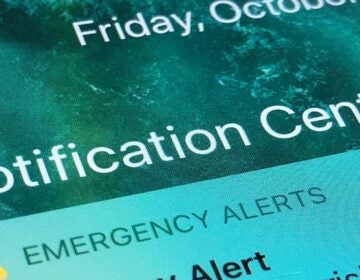Hundreds of newspapers denounce Trump’s attacks on media in coordinated editorials

The Boston Globe's logo as seen through the windows across from the new location of the Globe in Boston. The paper's editors coordinated a campaign defending a free press in editorials. (Joseph Prezioso/AFP/Getty Images)
More than 300 news publications across the country are joining together to defend the role of a free press and denounce President Trump’s ongoing attacks on the news media in coordinated editorials publishing Thursday, according a tally by The Boston Globe.
The project was spearheaded by editorial staff at the Globe, who write, “This relentless assault on the free press has dangerous consequences. We asked editorial boards from around the country – liberal and conservative, large and small – to join us today to address this fundamental threat in their own words.”
Editorials are typically written by opinion writers and are considered separate from organizations’ news coverage. NPR, for example, has a separate “opinion” category.
Trump made bashing the news media — “horrible, horrendous people” — a staple of his candidacy and a constant throughout his presidency.
He’s tweeted at least seven times since June referring to the news media in some way as the “enemy of the people.”
A slim majority of Republican respondents, 51 percent, consider the news media the “enemy of the people” in a poll released Tuesday by Quinnipiac University. Thirty-six percent of Republicans thought the media were “an important part of democracy.”
The question asked, “Which comes closer to your point of view: the news media is the enemy of the people, or the news media is an important part of democracy?” Overall, 65 percent of U.S. voters say the media are an important part of democracy, according to Quinnipiac.
The poll asked respondents if they were concerned that the president’s attacks would lead to violence against people who work in media. Fifty-two percent of respondents said they were not concerned, while 44 percent said they were.
Reporters themselves feel increasingly at risk of violence — in addition to receiving threatening messages.
“‘I hope you get raped and killed,’ one person wrote to me just this week,” MSNBC’s Katy Tur said on air recently. “‘Raped and killed.’ Not just me, but a couple of my female colleagues as well.” She added that the letter ended with “MAGA,” short for Trump’s slogan, “Make America Great Again.”
Earlier this month, CNN’s Jim Acosta pressed White House press secretary Sarah Sanders to say the news media are not the enemy, which she would not do.
Acosta tweeted a video on July 31 he said was from a Trump rally, featuring Trump supporters giving the middle finger to the camera and one person yelling, “stop lying.”
Some reporters say they’re receiving heightened security measures when covering Trump rallies, according to Politico, though many outlets don’t comment publicly about such matters.
Thirty-one journalists have been attacked so far in 2018, according to the U.S. Press Freedom Tracker. In June, five employees were killed in the Capital Gazette newsroom in Annapolis by a man with a longstanding grudge.
In a column called “A Free Press Needs You,” The New York Times’ editorial board writes that “Criticizing the news media — for underplaying or overplaying stories, for getting something wrong — is entirely right. News reporters and editors are human, and make mistakes. Correcting them is core to our job. But insisting that truths you don’t like are ‘fake news’ is dangerous to the lifeblood of democracy. And calling journalists the ‘enemy of the people’ is dangerous, period.”
Small publications across the country participated as well.
Charlie Smith of The Columbian-Progress of Columbia, Miss., wrote that newspapers “are the ultimate friend of the people. To attack them is to attack our own selves.”
“Americans may not like the news they see or hear but they should not hold that against those who report it,” TriCorner News from The Lakeville Journal Company in Lakeville, Conn., writes. “In short, don’t shoot the messenger.”
Editorial pages have criticized Trump before. The current effort “is sure to backfire,” writes Jack Shafer in Politico. “It will provide Trump with circumstantial evidence of the existence of a national press cabal that has been convened solely to oppose him. When the editorials roll off the press on Thursday, all singing from the same script, Trump will reap enough fresh material to [wail] on the media for at least a month.”
9(MDAzMzI1ODY3MDEyMzkzOTE3NjIxNDg3MQ001))




